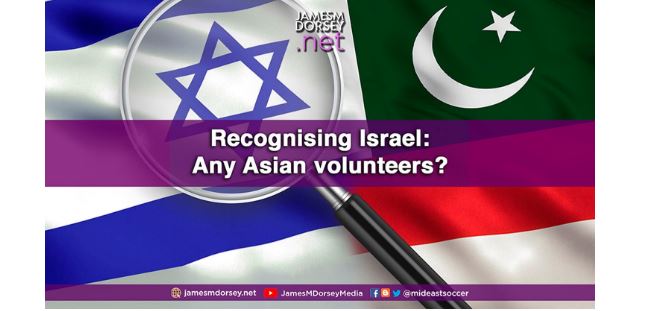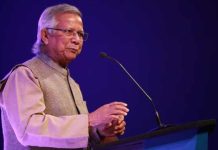The question for Saudi Arabia and Pakistan is not whether either country will recognise Israel but when and who will go first. For the past two years, Saudi Arabia was believed to want a Muslim state in Asia, home to the world’s three most populous Muslim majority countries, to recognise Israel first. Asian recognition would give the kingdom, home to Islam’s two holiest cities, Mecca and Medina, a welcome fig leaf.
Numbers, as expressed by population size, were one reason. Compared to Saudi Arabia’s 35 million people, Pakistan has a population of 221 million, Indonesia 274 million, and Bangladesh 165 million.
That was one reason Saudi Arabia preferred an Asian state to take the lead in following the United Arab Emirates, Bahrain, Morocco, and Sudan, who recognised Israel in the least two years.
Likely more important was the expectation that potential mass protest against a move toward Israel was more likely to erupt in Asia, where the margin for expressing dissent is greater than in much of the Middle East. Such protests, it was thought, would distract attention from the Custodian of the Holy Cities taking similar steps.
Saudi Arabia has signaled for some time that it would like to formalize its expanding informal relations with Israel but needs a cover to do so. The kingdom has emphasized this in recent weeks as it sought Israeli acquiescence in the transfer by Egypt to Saudi Arabia of sovereignty over two islands at the top of the Red Sea and prepared for a possible visit by US President Joe Biden.
The visit is designed to improve relations strained since Mr. Biden came to office over Saudi doubts about US security commitments, US demands that the kingdom increase oil production in a bid to reduce prices and limit Russian energy exports, Saudi acquisition of Chinese missiles, and the 2018 killing of journalist Jamal Khashoggi.
In advance of a visit, Saudi Arabia has not rejected a US proposal for a regional Middle Eastern air defence system that would include the kingdom and Israel.
Mujtahid, an anonymous tweeter who has repeatedly provided insights into the secretive workings of the House of Saud in recent years, reported that Saudi Arabia and Israel had created a “situation room” on the 14th floor of an Istanbul office building to advance the establishment of diplomatic relations. He said Saudi Crown Prince Mohammed bin Salman’s close aide, Saud al-Qahtani, headed the Saudi side.
Despite rampant speculation, Mr. Bin Salman is unlikely to see Mr. Biden’s visit as a capstone for recognition of Israel. More likely, he will continue to insist on a fig leaf in the form of progress in resolving the Israeli-Palestinian conflict or a major Asian Muslim-majority state going next.
Much of the attention focused in the almost two years since the UAE-led quartet forged relations with Israel focused on Indonesia. Not only because Indonesia is the world’s most populous Muslim majority state and its foremost Muslim democracy but also because it is home to the world’s most moderate mass Muslim civil society movement, Nahdlatul Ulama.
Heads of Nahdlatul Ulama have visited Israel and met Israeli leaders multiple times in the past two decades, even though Indonesia and Israel have no diplomatic relations. The movement also has close ties to various American Jewish groups.
Similarly, the absence of formal relations between Israel and Indonesia has not prevented Israeli diplomats, scholars, and journalists from maintaining contact with Indonesian counterparts and travelling to the archipelago nation or Indonesian pilgrims from touring the Jewish state. Nevertheless, Indonesia has rebuffed both the Trump and the Biden administration’s requests to move towards recognition.
Indonesia’s refusal may not come as a surprise. However, suggestions that Pakistan, despite its close ties to Saudi Arabia, may strike a deal with Israel come out of left field. Religious ultra-conservatism is woven into the fabric of society and at least some state institutions. Moreover, anti-Semitism is rampant in Pakistan.
Nonetheless, a recent visit to Israel by a delegation of Pakistani activists seeking to promote people-to-people contacts has sparked anger and debate in Pakistan. The group, which met with Israeli President Isaac Herzog, included American and British Pakistanis, prominent Pakistani journalist Ahmed Qureshi, and Fischel BenKhald, a Pakistani Jew.
“Without at least an overt nudge from powerful quarters, no Pakistani journalist could make this public trip to Israel and return safely, reflecting how attitudes pertaining to Israel have evolved in the world’s only Muslim nuclear power,” said London-based Pakistani journalist Hamza Azhar Salam.
That did not stop Pakistani state television from firing Mr. Qureishi.
“The good news is, we today have the first, robust and rich nationwide debate in Pakistan on establishing diplomatic ties with Israel. This is hug,” Mr. Qureishi said.
Many Pakistanis, led by ousted prime minister Imran Khan, saw the visit to Israel as part of an effort by Pakistan’s powerful military to forge closer ties to the Jewish state – a move Mr. Khan appears to have considered when he was in office.
His aide, Zulfi Bukhari, reportedly visited Israel for a meeting with then head of the Mossad, Yossi Cohen. Mr. Bukhari has denied travelling to Israel.
The visit by the Pakistani activists came two years after two Pakistani academics called in an op-ed in Israel’s Haaretz newspaper for Pakistani-Israeli cooperation in resolving the South Asian state’s water stress and upgrading its agriculture sector.
Similarly, Pakistani political analyst Saad Hafiz recently argued that Pakistan’s recognition of Israel would earn it the support of the Biden administration and the Israeli lobby in Washington for continued International Monetary Fund (IMF) aid for his country’s battered economy. Mr. Hafiz also reiterated that Pakistan could benefit from Israeli water conservation technology.
“The US leadership, Congress, and the powerful pro-Israel lobby could support the resumption of financial assistance to Pakistan as an incentive if it agrees to normalize ties with Israel, “ Mr. Saad said.
Pakistanis and Israeli have links in other ways. For example, many Pakistanis offer their services on Fiverr, an Israeli marketplace for freelance professionals.
Degrees of Saudi cooperation with Israel and Pakistani feelers contrasted starkly with legislation passed in the last two weeks by the Iraqi parliament criminalizing contact with Israel and by the Houthi government in Yemen that outlawed contact not only with Israel but also with Jews.
Pakistan is unlikely to follow Iraq or the Houthis. Even so, “it is unlikely that Pakistan’s fragile coalition government has the credibility and time to take the politically risky decision to open dialogue with Israel, especially with (Imran) Khan snipping at its heels,” Mr. Saad said. “Yet, bold decisions are needed for Pakistan to compete in a changing world.”
Dr. James M. Dorsey is an award-winning journalist and scholar, a Senior Fellow at the National University of Singapore’s Middle East Institute and Adjunct Senior Fellow at Nanyang Technological University’s S. Rajaratnam School of International Studies, and the author of the syndicated column and blog, The Turbulent World of Middle East Soccer.

















